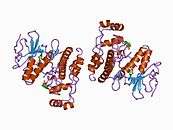MAPK12
| View/Edit Human | View/Edit Mouse |
Mitogen-activated protein kinase 12 (MAP kinase 12), also known as extracellular signal-regulated kinase 6 (ERK6) or stress-activated protein kinase 3 (SAPK3), is an enzyme that in humans is encoded by the MAPK12 gene.[3]
Function
Activation of members of the mitogen-activated protein kinase family is a major mechanism for transduction of extracellular signals. Stress-activated protein kinases are one subclass of MAP kinases. The protein encoded by this gene functions as a signal transducer during differentiation of myoblasts to myotubes.[3]
References
Further reading
- Stiffler MA, Grantcharova VP, Sevecka M, MacBeath G (2006). "Uncovering quantitative protein interaction networks for mouse PDZ domains using protein microarrays.". J. Am. Chem. Soc. 128 (17): 5913–22. doi:10.1021/ja060943h. PMC 2533859
 . PMID 16637659.
. PMID 16637659. - Joneson T, Bar-Sagi D (1997). "Ras effectors and their role in mitogenesis and oncogenesis.". J. Mol. Med. 75 (8): 587–93. doi:10.1007/s001090050143. PMID 9297626.
- Hou SW, Zhi HY, Pohl N, et al. (2010). "PTPH1 dephosphorylates and cooperates with p38gamma MAPK to increase ras oncogenesis through PDZ-mediated interaction.". Cancer Res. 70 (7): 2901–10. doi:10.1158/0008-5472.CAN-09-3229. PMC 2848905
 . PMID 20332238.
. PMID 20332238. - Gutierrez-Sanmartin D, Varela-Ledo E, Aguilera A, et al. (2008). "Implication of p38 mitogen-activated protein kinase isoforms (alpha, beta, gamma and delta) in CD4+ T-cell infection with human immunodeficiency virus type I.". J. Gen. Virol. 89 (Pt 7): 1661–71. doi:10.1099/vir.0.82971-0. PMID 18559936.
- Sabio G, Cerezo-Guisado MI, Del Reino P, et al. (2010). "p38gamma regulates interaction of nuclear PSF and RNA with the tumour-suppressor hDlg in response to osmotic shock.". J. Cell. Sci. 123 (Pt 15): 2596–604. doi:10.1242/jcs.066514. PMC 2908048
 . PMID 20605917.
. PMID 20605917. - Zhang J, Harrison JS, Studzinski GP (2011). "Isoforms of p38MAPK gamma and delta contribute to differentiation of human AML cells induced by 1,25-dihydroxyvitamin D₃.". Exp. Cell Res. 317 (1): 117–30. doi:10.1016/j.yexcr.2010.08.010. PMC 2998239
 . PMID 20804750.
. PMID 20804750. - Kwong J, Hong L, Liao R, et al. (2009). "p38alpha and p38gamma mediate oncogenic ras-induced senescence through differential mechanisms.". J. Biol. Chem. 284 (17): 11237–46. doi:10.1074/jbc.M808327200. PMC 2670128
 . PMID 19251701.
. PMID 19251701. - Morishima-Kawashima M, Hasegawa M, Takio K, et al. (1995). "Hyperphosphorylation of tau in PHF.". Neurobiol. Aging. 16 (3): 365–71; discussion 371–80. doi:10.1016/0197-4580(95)00027-C. PMID 7566346.
- Diskin R, Askari N, Capone R, et al. (2004). "Active mutants of the human p38alpha mitogen-activated protein kinase.". J. Biol. Chem. 279 (45): 47040–9. doi:10.1074/jbc.M404595200. PMID 15284239.
- Askari N, Diskin R, Avitzour M, et al. (2007). "Hyperactive variants of p38alpha induce, whereas hyperactive variants of p38gamma suppress, activating protein 1-mediated transcription.". J. Biol. Chem. 282 (1): 91–9. doi:10.1074/jbc.M608012200. PMID 17088247.
- Krauss RS, Cole F, Gaio U, et al. (2005). "Close encounters: regulation of vertebrate skeletal myogenesis by cell-cell contact.". J. Cell. Sci. 118 (Pt 11): 2355–62. doi:10.1242/jcs.02397. PMID 15923648.
- Talmud PJ, Drenos F, Shah S, et al. (2009). "Gene-centric association signals for lipids and apolipoproteins identified via the HumanCVD BeadChip.". Am. J. Hum. Genet. 85 (5): 628–42. doi:10.1016/j.ajhg.2009.10.014. PMC 2775832
 . PMID 19913121.
. PMID 19913121. - Olsen JV, Blagoev B, Gnad F, et al. (2006). "Global, in vivo, and site-specific phosphorylation dynamics in signaling networks.". Cell. 127 (3): 635–48. doi:10.1016/j.cell.2006.09.026. PMID 17081983.
- Tosti E, Waldbaum L, Warshaw G, et al. (2004). "The stress kinase MRK contributes to regulation of DNA damage checkpoints through a p38gamma-independent pathway.". J. Biol. Chem. 279 (46): 47652–60. doi:10.1074/jbc.M409961200. PMID 15342622.
- Gerhard DS, Wagner L, Feingold EA, et al. (2004). "The status, quality, and expansion of the NIH full-length cDNA project: the Mammalian Gene Collection (MGC).". Genome Res. 14 (10B): 2121–7. doi:10.1101/gr.2596504. PMC 528928
 . PMID 15489334.
. PMID 15489334. - Qi X, Pohl NM, Loesch M, et al. (2007). "p38alpha antagonizes p38gamma activity through c-Jun-dependent ubiquitin-proteasome pathways in regulating Ras transformation and stress response.". J. Biol. Chem. 282 (43): 31398–408. doi:10.1074/jbc.M703857200. PMID 17724032.
- Collins JE, Wright CL, Edwards CA, et al. (2004). "A genome annotation-driven approach to cloning the human ORFeome.". Genome Biol. 5 (10): R84. doi:10.1186/gb-2004-5-10-r84. PMC 545604
 . PMID 15461802.
. PMID 15461802. - Kukkonen-Macchi A, Sicora O, Kaczynska K, et al. (2011). "Loss of p38gamma MAPK induces pleiotropic mitotic defects and massive cell death.". J. Cell. Sci. 124 (Pt 2): 216–27. doi:10.1242/jcs.068254. PMID 21172807.
- Sofroniew MV, Howe CL, Mobley WC (2001). "Nerve growth factor signaling, neuroprotection, and neural repair.". Annu. Rev. Neurosci. 24: 1217–81. doi:10.1146/annurev.neuro.24.1.1217. PMID 11520933.
- Bailey SD, Xie C, Do R, et al. (2010). "Variation at the NFATC2 locus increases the risk of thiazolidinedione-induced edema in the Diabetes REduction Assessment with ramipril and rosiglitazone Medication (DREAM) study.". Diabetes Care. 33 (10): 2250–3. doi:10.2337/dc10-0452. PMC 2945168
 . PMID 20628086.
. PMID 20628086.
This article incorporates text from the United States National Library of Medicine, which is in the public domain.
This article is issued from Wikipedia - version of the 5/30/2016. The text is available under the Creative Commons Attribution/Share Alike but additional terms may apply for the media files.
